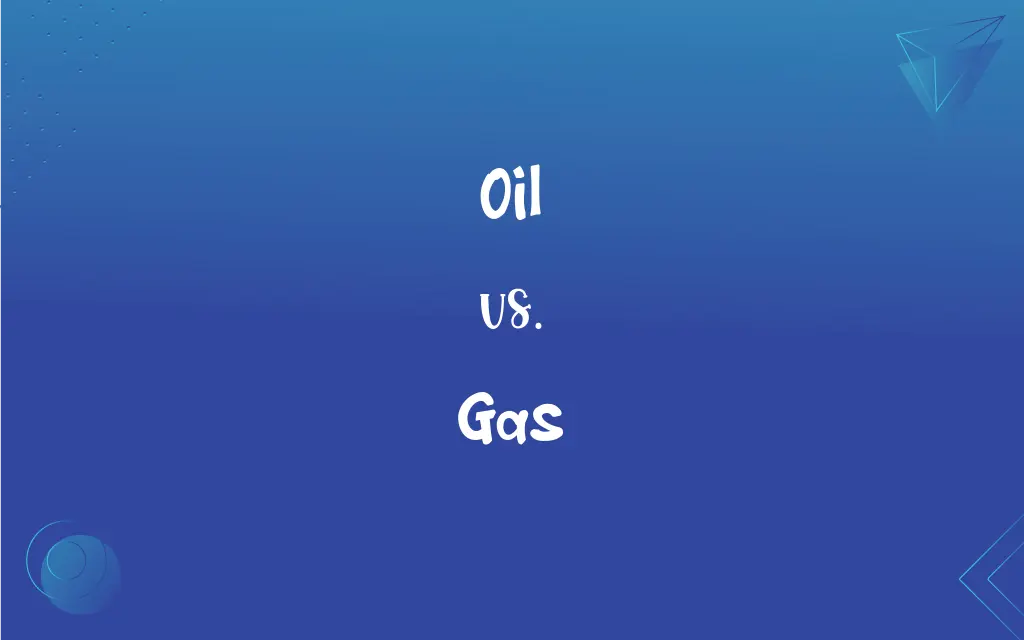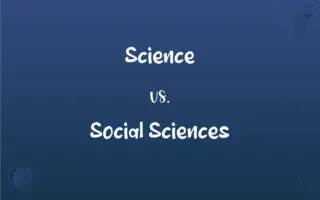Oil vs. Gas: What's the Difference?
Edited by Aimie Carlson || By Harlon Moss || Published on February 26, 2024
Oil is a liquid fossil fuel used for energy and lubrication, while gas, typically natural gas, is a combustible gaseous hydrocarbon used for heating and electricity.

Key Differences
Oil, a thick, viscous liquid, is primarily used as a fuel and lubricant. Gas, in contrast, is a lighter, gaseous substance, used mainly for heating and as a fuel for vehicles converted to run on compressed or liquefied natural gas.
The extraction process of oil involves drilling into the earth's crust, whereas natural gas is often extracted alongside or from oil wells but can also be found in separate gas fields. Oil refining produces various fuels and chemical products, whereas gas requires less processing before use.
Oil is transported in liquid form, typically via pipelines, tankers, or barrels, making its logistics complex and costly. Gas, being lighter, can be transported through pipelines or converted to liquid form (LNG) for transportation over long distances.
Oil's usage spans from fueling vehicles and industries to being a base for plastics and pharmaceuticals. Gas is primarily used for heating, cooking, and electricity generation, and increasingly as a cleaner alternative to coal and oil in power plants.
Oil spills are a significant environmental concern due to their long-term impact on ecosystems. Gas leaks, while also harmful, mainly pose immediate risks like explosions and contribute to greenhouse gas emissions if unburned.
ADVERTISEMENT
Comparison Chart
State at Room Temperature
Liquid
Gas
Primary Uses
Fuel, lubrication, manufacturing
Heating, electricity, vehicle fuel
Extraction Method
Drilled from earth's crust
Extracted from oil wells or gas fields
Transportation
Pipelines, tankers, barrels
Pipelines, as LNG for long distances
Environmental Impact
Oil spills, long-term ecosystem damage
Explosions, greenhouse gas emissions
ADVERTISEMENT
Oil and Gas Definitions
Oil
Oil is a natural fossil fuel in liquid form used for energy.
The car's engine runs smoother when the oil is regularly changed.
Gas
Gas, often natural gas, is a combustible fossil fuel used for heating and electricity.
Our home heating system uses natural gas for warmth.
Oil
Oil is a lubricant, reducing friction between mechanical parts.
Regularly oiling the gears helps in maintaining the bicycle's performance.
Gas
Compressed natural gas (CNG) is used as a fuel in transport vehicles.
Many city buses now run on compressed natural gas for efficiency.
Oil
Oil serves as a base for various industrial and consumer products.
Many cosmetics contain oil as a moisturizing ingredient.
Gas
Gas is also a term for the state of matter characterized by free-moving molecules.
Oxygen and nitrogen in the air we breathe are in gas form.
Oil
Crude oil is refined to produce fuels like gasoline and diesel.
The refinery processes crude oil to meet the high demand for gasoline.
Gas
Gas is found in underground reservoirs and extracted through drilling.
The new gas field will supply the region for the next decade.
Oil
Oil is used in the production of plastics and synthetic materials.
This plastic bottle is made from polymers derived from oil.
Gas
Gas is a clean-burning fuel, making it a preferred energy source.
The power plant switched to gas to reduce its carbon emissions.
Oil
Any of numerous mineral, vegetable, or synthetic substances or animal or vegetable fats that are generally slippery, combustible, viscous, liquid or liquefiable at room temperatures, soluble in various organic solvents such as ether but not in water, and used in a great variety of products, especially lubricants and fuels.
FAQs
How is oil extracted?
Oil is extracted by drilling into the earth where oil reservoirs are located.
Can oil be used for electricity generation?
Yes, oil can be burned to generate electricity, though it's less common than gas.
What is oil primarily used for?
Oil is used as a fuel, lubricant, and in manufacturing various products.
What are the main uses of gas?
Gas is used for heating, electricity generation, and as a vehicle fuel.
Where does gas come from?
Gas is extracted from underground reservoirs, often found with or near oil.
Can gas be liquified for transportation?
Yes, gas can be converted to LNG (Liquified Natural Gas) for easier transport.
Are oil spills more harmful than gas leaks?
Oil spills can have long-term environmental impacts, while gas leaks pose immediate risks like explosions.
Is gas cleaner than oil?
Yes, gas burns cleaner than oil, producing fewer pollutants.
Can both oil and gas be used in vehicles?
Yes, oil in the form of gasoline or diesel, and gas as CNG or LNG.
Is gas used in cooking?
Yes, natural gas is a common fuel for cooking appliances.
How does the refining of oil work?
Oil is refined through a process of distillation and conversion to create various products.
How is oil transported?
Oil is transported via pipelines, tankers, or in barrels.
Is gas renewable?
Natural gas is non-renewable, but biogas is a renewable alternative.
Is oil renewable?
No, oil is a non-renewable fossil fuel.
Does the burning of oil contribute to climate change?
Yes, burning oil releases greenhouse gases contributing to climate change.
Does gas production affect the environment?
Yes, gas production and usage contribute to greenhouse gas emissions.
Can oil and gas reserves run out?
Yes, they are finite resources and can be depleted.
Are there alternatives to oil and gas?
Yes, alternatives include renewable energy sources like solar, wind, and hydroelectric power.
How does the price of oil affect the economy?
Fluctuations in oil prices can significantly impact global economies.
Are there environmental regulations for oil and gas production?
Yes, there are numerous regulations to minimize environmental impacts.
About Author
Written by
Harlon MossHarlon is a seasoned quality moderator and accomplished content writer for Difference Wiki. An alumnus of the prestigious University of California, he earned his degree in Computer Science. Leveraging his academic background, Harlon brings a meticulous and informed perspective to his work, ensuring content accuracy and excellence.
Edited by
Aimie CarlsonAimie Carlson, holding a master's degree in English literature, is a fervent English language enthusiast. She lends her writing talents to Difference Wiki, a prominent website that specializes in comparisons, offering readers insightful analyses that both captivate and inform.







































































